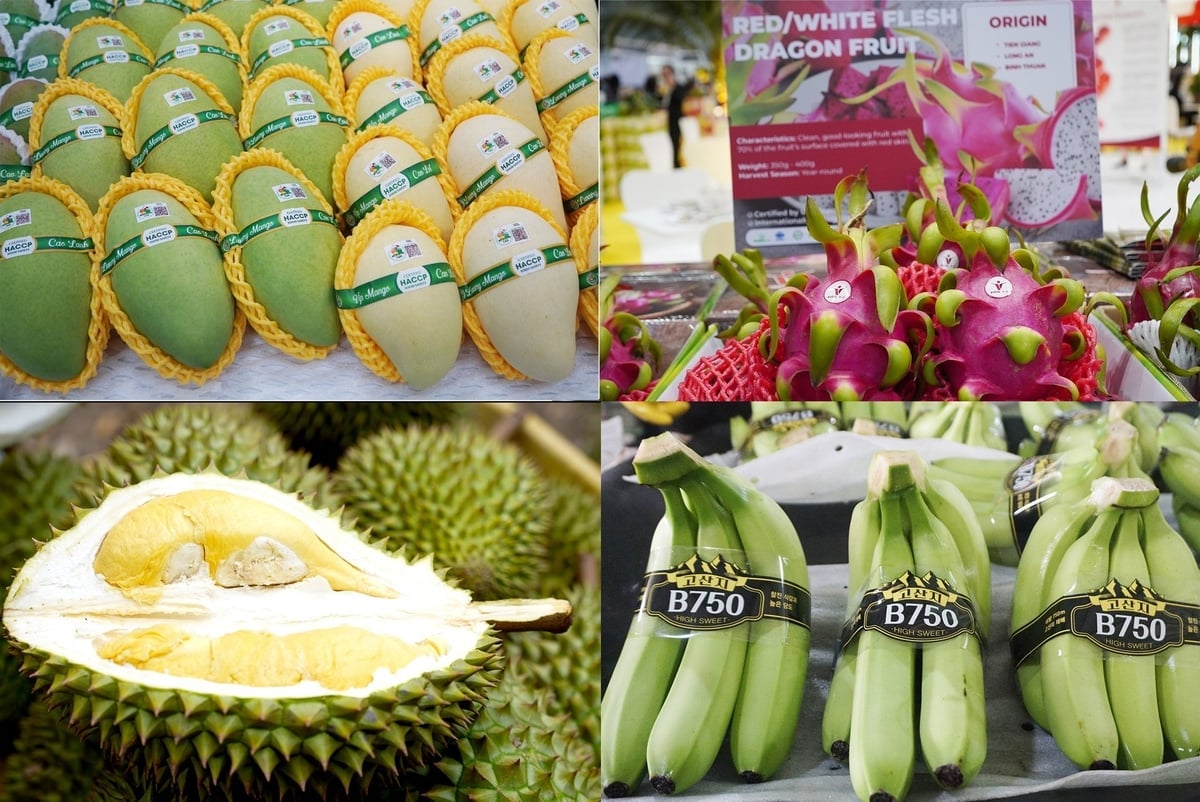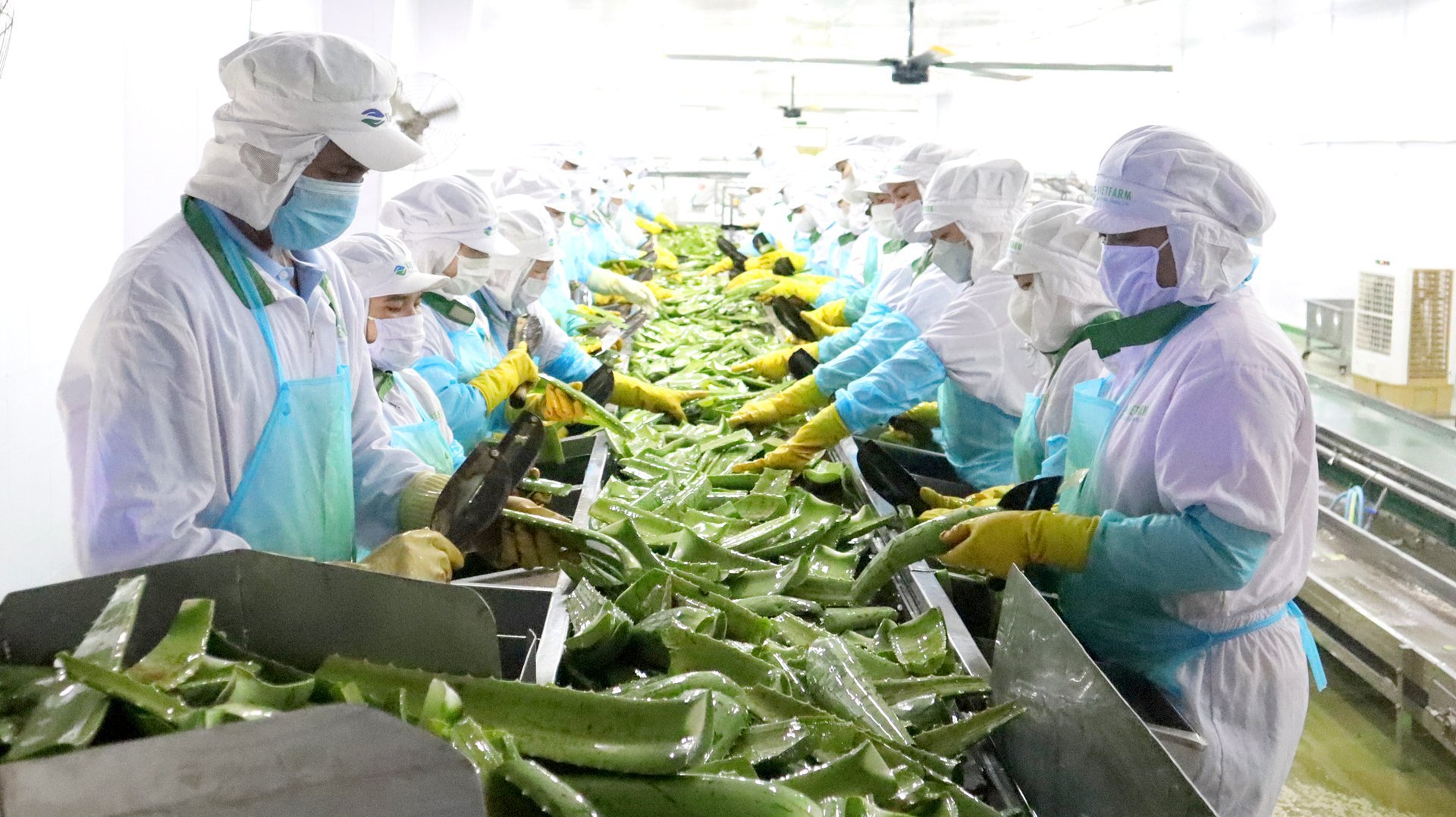November 24, 2025 | 10:20 GMT +7
November 24, 2025 | 10:20 GMT +7
Hotline: 0913.378.918
November 24, 2025 | 10:20 GMT +7
Hotline: 0913.378.918
According to statistics from the Ministry of Agriculture and Environment, Vietnam’s fruit and vegetable exports in April 2025 were estimated at USD 452.6 million, bringing the total export value for the first four months of 2025 to USD 1.62 billion, a decrease of 14.2% compared to the same period in 2024.
Vietnamese fruits and vegetables are mainly exported to China (accounting for 44.8%), the United States (9.6%), and South Korea (6.2%). Compared to the same period last year, export value in the first three months of 2025 to China dropped by 31.3%, South Korea by 3.2%, and exports to the United States rose by 65%.

Vietnam has many competitive products suitable for export to the Middle Eastern market. Photo: Nguyen Thuy.
In addition to internal difficulties within the supply chain, Vietnam’s fruit and vegetable exports in 2025 will be affected by U.S.–China trade tensions and geopolitical conflicts in several countries. If market-related challenges are not resolved soon, the goal of reaching 8 billion USD in fruit and vegetable export turnover this year will be hard to achieve.
Speaking with the Vietnam Agriculture and Nature Newspaper, Mr. Nguyen Dinh Tung, Vice Chairman of the Vietnam Fruit and Vegetable Association, stated that expanding and diversifying export markets is essential under the current context.
“When the U.S. imposes tariff measures, and meanwhile China keeps tightening technical barriers, the fruit and vegetable sector cannot continue to rely on just one or two markets. The Middle East and Africa are two new destinations that need to be properly tapped,” said Mr. Nguyen Dinh Tung.
"In any market, businesses must protect the Vietnamese product brands, protect their bussiness brands, and ensure product quality, while avoiding unfair competition that could harm the nation’s reputation," shared Mr. Nguyen Dinh Tung.
The Middle East - a region comprising 16 countries with a population of around 400 million, is a potential market for Vietnamese agricultural products and food. Key focus is placed on the six countries of the Gulf Cooperation Council (GCC): UAE, Saudi Arabia, Kuwait, Bahrain, Qatar, and Oman. These countries are all WTO members and have already established trade relations with Vietnam.
The signing of the Comprehensive Economic Partnership Agreement (CEPA) between Vietnam and the UAE on October 28, 2024, also opens up significant opportunities for agricultural products, seafood, wooden goods, cashew nuts, pepper, and dried fruits to penetrate deeper into the UAE market in particular and the Middle East market in general.
“The Middle East consumes nearly all Vietnamese products, from fresh fruits to spices. Africa is a rapidly growing market but lacks domestic supply, especially food and agricultural goods. Vietnam can consider it a niche market for fruits and vegetables, rice, and dried seafood. However, businesses must pay close attention to Halal requirements, as each country has its own regulatory system that must be strictly followed,” the Vice Chairman of the Vietnam Fruit and Vegetable Association recommended.
Although considered more “accessible” than the U.S. or Chinese markets, the Middle East and African markets also carry significant risks, particularly regarding payment terms.
“Vietnamese businesses must be extremely cautious when signing contracts. They should not be lenient in allowing debt or accepting unclear payment terms to stay competitive. The financial risks are substantial,” said Mr. Nguyen Dinh Tung. He emphasized that the key factor remains each business’s initiative in seeking reliable partners, ensuring secure payments, and committing to long-term cooperation.
In addition, businesses should take advantage of the current presence of many international shipping lines operating in Vietnam to choose stable logistics costs.
To support businesses, Mr. Nguyen Dinh Tung said that the Vietnam Fruit and Vegetable Association is actively coordinating with relevant authorities such as the Ministry of Agriculture and Environment, the Ministry of Industry and Trade to provide market information, organize trade promotion activities, and facilitate business connections. At the same time, the association is working with the Department of Crop Production and Protection (under the Ministry of Agriculture and Environment) to issue warnings about unreliable businesses, thereby enabling timely oversight.
When asked about the keyword for the strategy to tap into this market, Mr. Nguyen Dinh Tung did not hesitate to choose safety. “Safety in product quality, safety in payment, and safety in long-term cooperative relationships. Don’t rush or compromise your brand’s reputation for low prices or unhealthy competition. A small mistake can cost you the entire market,” recommended Nguyen Dinh Tung, Vice Chairman of the Vietnam Fruit and Vegetable Association.
Thanks to strategic investments and a well-planned approach, with modern and professional manufacturing facilities located in Dong Nai and Ninh Thuan, GC Food Joint Stock Company (GC Food) has become one of the leading enterprises in the production of aloe vera and nata de coco in Vietnam.
GC Food is the primary supplier of aloe vera products for major domestic brands such as Vinamilk and Nutifood. It also exports to 22 countries and territories, with key markets including South Korea, Japan, and the United States.

GC Food's factories are currently operating under strict production standards, including FSSC 22000, ISO 22000, Halal, USDA, and more. Photo: Nguyen Thuy.
Mr. Nguyen Van Thu, Chairman of the Board of Directors at GC Food, stated: “In 2025, our goal is to become a high-tech enterprise in agricultural and food production.” To achieve this, the company prioritizes a comprehensive digital transformation, optimizing operational processes to enhance efficiency and reduce costs. Key investments are being made in cutting-edge technologies, from advanced processing systems to renewable energy initiatives such as solar power and hot water systems for manufacturing.
GC Food also focuses on improving the quality of disease-free plant varieties through tissue culture technology, aiming to complete a closed value chain from seedlings to final products. Additionally, the company is leveraging agricultural by-products to produce organic fertilizers, moving toward a circular agriculture model.
In the Halal market, GC Food has been certified since 2013 for its aloe vera and coconut products. It currently supplies raw materials to several domestic and international brands.
“In the Middle East market, although our current export volume remains modest due to local consumption habits, we are actively promoting trade to expand our market share. This is one of the most promising markets and an integral part of GC Food’s long-term development strategy,” said Mr. Nguyen Van Thu.
In addition to aloe vera and nata de coco products, the company is also focusing on developing organic and circular agriculture models, with various fruits and vegetables such as apples, melons, grapes, and guavas. These are cultivated under five key principles: non-GMO, no herbicides, no chemical fertilizers, no preservatives, and sustainability at the core.
Despite global uncertainties, GC Food targets a 30–40% increase in export revenue in 2025 and remains firmly committed to its sustainable development strategy.
Translated by Phuong Linh

(VAN) Applying green technology in rural water supply and sanitation helps improve resource efficiency, protect the environment, and enhance community living standards.

(VAN) Developing biosecure livestock production is the key that helps Tuyen Quang form linked chains in livestock production and build its brand in the market.

(VAN) During his bilateral activities in South Africa, Prime Minister Pham Minh Chinh welcomed Vice President of the South African Chamber of Commerce and Industry Neil Pollock.

(VAN) Prof. Dr. Hoang Van Cuong, National Assembly Deputy of the 14th and 15th terms, shares recent pioneering policy decisions.

(VAN) Deputy Minister Tran Thanh Nam directed a comprehensive reform of the agricultural extension system, emphasizing professionalism and connecting farmers with the market.
/2025/11/22/3633-1-072521_760.jpg)
(VAN) The signing ceremony took place under the witness of Prime Minister Pham Minh Chinh and President of the Republic of South Africa Cyril Ramaphosa.

(VAN) Severe flooding in Khanh Hoa Province has caused catastrophic damage estimated at around USD 30 million, with the agriculture and irrigation sectors alone accounting for roughly USD 15.7 million in losses.